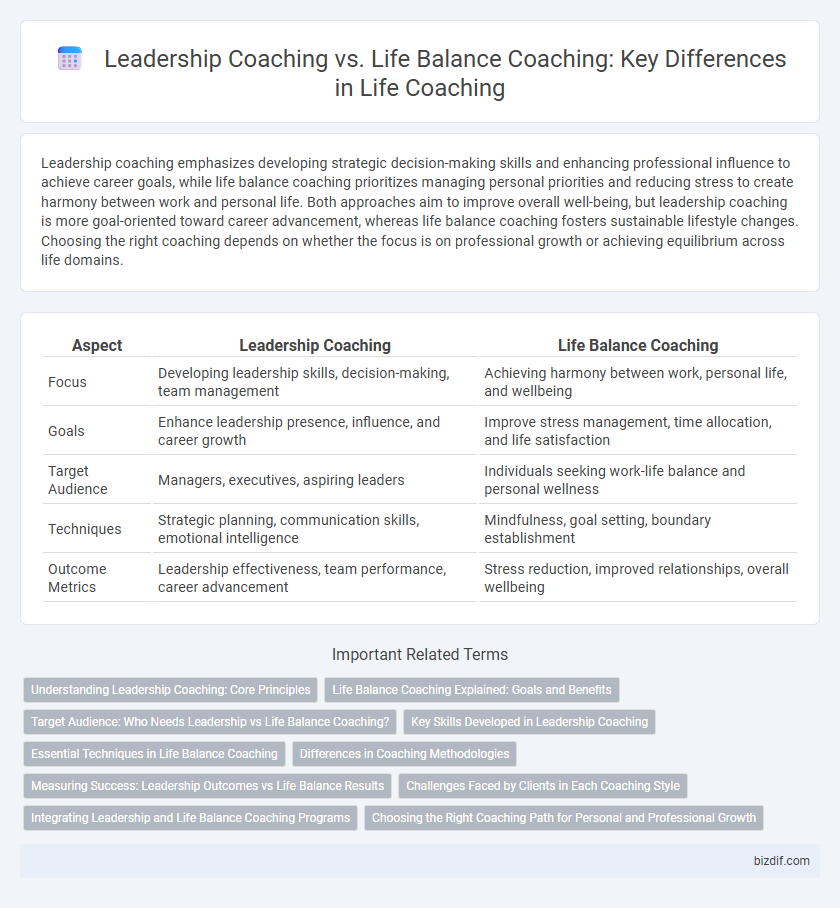Leadership coaching emphasizes developing strategic decision-making skills and enhancing professional influence to achieve career goals, while life balance coaching prioritizes managing personal priorities and reducing stress to create harmony between work and personal life. Both approaches aim to improve overall well-being, but leadership coaching is more goal-oriented toward career advancement, whereas life balance coaching fosters sustainable lifestyle changes. Choosing the right coaching depends on whether the focus is on professional growth or achieving equilibrium across life domains.
Table of Comparison
| Aspect | Leadership Coaching | Life Balance Coaching |
|---|---|---|
| Focus | Developing leadership skills, decision-making, team management | Achieving harmony between work, personal life, and wellbeing |
| Goals | Enhance leadership presence, influence, and career growth | Improve stress management, time allocation, and life satisfaction |
| Target Audience | Managers, executives, aspiring leaders | Individuals seeking work-life balance and personal wellness |
| Techniques | Strategic planning, communication skills, emotional intelligence | Mindfulness, goal setting, boundary establishment |
| Outcome Metrics | Leadership effectiveness, team performance, career advancement | Stress reduction, improved relationships, overall wellbeing |
Understanding Leadership Coaching: Core Principles
Leadership coaching centers on enhancing an individual's ability to influence and guide teams effectively by developing strategic thinking, communication skills, and emotional intelligence. Core principles emphasize goal-setting aligned with organizational vision, accountability, and fostering resilience under pressure. Unlike life balance coaching, which prioritizes personal well-being and harmony among life domains, leadership coaching drives professional growth and decision-making excellence.
Life Balance Coaching Explained: Goals and Benefits
Life Balance Coaching focuses on helping individuals achieve harmony between their personal and professional lives by setting realistic goals and managing time effectively. This coaching approach promotes mental clarity, reduces stress, and enhances overall well-being by addressing areas like work-life integration, self-care, and prioritization. Clients often experience improved emotional resilience, increased productivity, and a deeper sense of fulfillment through targeted strategies and personalized support.
Target Audience: Who Needs Leadership vs Life Balance Coaching?
Leadership coaching targets executives, managers, and emerging leaders seeking to enhance decision-making, team management, and strategic thinking skills. Life balance coaching serves individuals facing stress, burnout, or challenges juggling work, personal life, and wellness priorities. Professionals aiming to boost career performance benefit from leadership coaching, while those striving for overall well-being and time management gain value from life balance coaching.
Key Skills Developed in Leadership Coaching
Leadership coaching hones essential skills such as strategic thinking, effective communication, emotional intelligence, decision-making, and team management. These competencies enable leaders to inspire, motivate, and guide teams toward achieving organizational goals. Mastery of conflict resolution and performance optimization further distinguishes leadership coaching from life balance coaching, which centers more on personal well-being and stress management.
Essential Techniques in Life Balance Coaching
Life balance coaching emphasizes essential techniques such as mindfulness practices, boundary setting, and personalized time management strategies to help clients achieve holistic well-being. These techniques focus on aligning personal values with daily routines to reduce stress and foster sustainable habits. Unlike leadership coaching, which targets career growth and organizational influence, life balance coaching prioritizes emotional regulation and self-care for overall life satisfaction.
Differences in Coaching Methodologies
Leadership coaching centers on developing strategic thinking, decision-making skills, and enhancing leadership presence to drive organizational success. Life balance coaching prioritizes holistic well-being, focusing on time management, stress reduction, and aligning personal values with lifestyle choices. The methodologies differ as leadership coaching often uses goal-oriented frameworks and performance metrics, while life balance coaching employs reflective exercises and mindfulness practices to foster sustainable personal growth.
Measuring Success: Leadership Outcomes vs Life Balance Results
Leadership coaching success is measured through enhanced decision-making skills, team performance improvements, and achievement of organizational goals. Life balance coaching outcomes focus on increased personal well-being, stress reduction, and improved work-life harmony. Tracking these distinct metrics helps tailor coaching approaches to meet specific client objectives effectively.
Challenges Faced by Clients in Each Coaching Style
Leadership coaching clients often struggle with decision-making under pressure, managing team dynamics, and developing strategic vision for organizational success. Life balance coaching clients typically face challenges in managing time effectively, reducing stress from competing personal and professional demands, and fostering healthy habits to improve overall well-being. Both coaching styles require tailored approaches to address the unique obstacles that hinder clients' growth in their respective areas.
Integrating Leadership and Life Balance Coaching Programs
Integrating leadership coaching and life balance coaching programs enhances personal effectiveness by addressing both professional skills and holistic well-being. Leadership coaching develops strategic decision-making, communication, and team management, while life balance coaching focuses on stress management, time allocation, and personal fulfillment. Combining these approaches fosters resilient leaders who achieve organizational goals without compromising health or personal values.
Choosing the Right Coaching Path for Personal and Professional Growth
Leadership coaching concentrates on developing strategic decision-making, communication skills, and team management to enhance professional effectiveness and career advancement. Life balance coaching emphasizes achieving harmony among work, relationships, and personal well-being to reduce stress and improve overall quality of life. Selecting the appropriate coaching path depends on identifying whether the primary goal is professional leadership development or cultivating personal equilibrium for sustainable growth.
Leadership Coaching vs Life Balance Coaching Infographic

 bizdif.com
bizdif.com